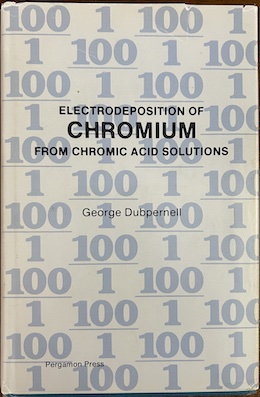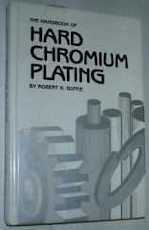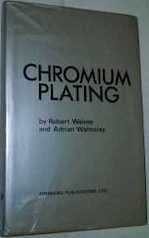
Curated with aloha by
Ted Mooney, P.E. RET

The authoritative public forum
for Metal Finishing 1989-2025

-----
Platinised titanium anodes for chrome plating
Dear Selva,
I read your interesting text about the anode for hard chromium plating. I have a question in this field. Some of companies propose titanium based lead dioxide anodes for hard chromium plating. Do you have any experience in using of this anode?
The Best Regards,
Kourosh Jafarzadeh
-Tehran, Iran
July 11, 2022
⇩ Related postings, oldest first ⇩
Q. What causes low efficiency in chrome plating? What can be done to improve it? If plating is done with platinized titanium, how to maintain condition of anodes?
Payal Mag
- Charlotte, North Carolina
2001
A. Hi Payal.
Low efficiency in a chrome solution occurs when you have bad anodes (if the anode is yellow you must clean or change the anodes), low ratio or wrong catalyst. If you use platinized titanium anodes the trivalent chrome will be high in your solution and that decreases efficiency in the solution. This type of anode will not oxidize trivalent chrome to hexavalent chrome. You can try to use a little small cathode rack (count this in your calculation for the area) besides your part when you use platinized titanium anodes and bigger lead anodes to get the trivalent chrome to oxidized to hexavalent chrome.
Regards

Anders Sundman
4th Generation Surface Engineering
Consultant - Arvika,
Sweden
by George Dubpernell"

on AbeBooks
or eBay or
Amazon
(affil links)
Q. Dear Mr. Sundman,
I understand that if we clean platinized titanium the chromate layer developed will get spoiled and expensive anodes may get spoiled. Do you suggest to rinse them? Should one clean them with a soft brush? Do you suggest chrome solution in touch with anode even when we are not plating? How much lead oxide do you recommend in bath when platinized titanium is used?
Payal Mag [returning]
- Charlotte, North Carolina
A. Payal,
Try to clean them in NaOH 100 gr /l and Rochelle salt
⇦ this on
eBay
or
Amazon [affil links]
100 gr /l and 100 liter water. Use a larger lead anode than the rack, that is enough. When not using the solution you can electrolyze by using a small cathode bar and a larger anode area.
Regards

Anders Sundman
4th Generation Surface Engineering
Consultant - Arvika,
Sweden
Multiple threads merged: please forgive chronology errors and repetition 🙂
Q. We are looking for a information on use of Platinum Clad Anode for Hard Chrome Plating operation. Can it be used in Hard Chrome Plating operation in place of conventional Lead Tin / Antimony Lead Anode?
R. K. Khare
- Mumbai, Maharashtra, India
2001
by Robert K. Guffie

on AbeBooks
(rarely)
or eBay
(rarely)
or Amazon
(affil links)
A. Dear Mr. Khare,
Platinised Titanium can be definitely used for Hard chrome plating. Only disadvantage is that it very expensive and it does not convert trivalent chrome back to hexavalent chrome. The chrome chemistry should also not contain any Fluoride.
GS sharma
- Mumbai, India
A. The problem of Trivalent can be solved by keeping some lead in solution. Say addition of lead carbonate in bath can create a film on platinized titanium which can keep bath in balance. The ratio of anode and cathode will also play role in maintaining balance. The life of platinized titanium anode is very long.
Payal Mag
- Charlotte, North Carolina
A. Anodes for Chrome Plating in Fluoride Containing Baths Fluorides are added to Cr+6 and Cr+3 baths. Sodium fluoride up to 500 mg F-/ l is added to activate steels by polarity reversal. Fluoroborates or silicofluorides are added in self-regulating Cr+6 baths. The F- content varies with the bath producer and reaches up to 2 g F-/l.
Only the free F- attacks the metals. The severeness of the corrosion depends on the F- content, other bath parameters and the anodic current density and starts from the weakest surface areas, like scratches, fissures and pores in a coating. The user seldom knows the F- content of his bath. Therefore tests are advised for the producers or users of chrome baths.
Unplatinised Ti, Nb or desired other noble metals are submerged into the chrome bath under working conditions, contacted anodically. While increasing the voltage the tested metal shows with the jerky current increase it's breakdown-voltage.
Practical experience shows: Ti withstand F- up to 10 mg / l, a PTA with 5 microns Pt works nearly one year at 50 mg F-/ l, nevertheless we recommend for this use a PNA. Nb withstands a F--content until 600 mg / l, a PNA is used from 50 to 500 mg F-/ l up to currents of 20 Amps / sq dm. For even higher F- contents PTW can be used. But metal mesh out of tungsten cannot be produced.
Also fluoride is added to decorative black Cr3+ baths. For these baths mixed oxides activated titanium (MMOA) is applied. In the version of IrTa-oxide users have added F- up to 50-100 g F-/ l. The coating withstands up to 600 g F-/ l, but scratches and pores in the PTA with 5 microns Pt-layer failed after 11 months in a bath of 90 mg F-/l. MMOA Ti-anodes were used for years in a trivalent chrome bath at 70 mg F-/l.
Conclusions: PTA can only be used at low F- content of ~ 10 mg F-/l. For F- content up to 600 mg/l PNA is be used, higher F- content requires tungsten as the base. The user is advised to test the suitability of Nb or W as anode substrates under the actual plating conditions.
K.S. Selva
Sai Electro- - Chennai, India
2002
A. Platinised Niobium anode is the best solution for Hard chrome plating bath. If you have high fluoride in the bath platinised titanium will not stand.
Vanajambika Jeyakumar
- Chennai, India
2004
Multiple threads merged: please forgive chronology errors and repetition 🙂
by Weiner & Walmsley

on AbeBooks
(rarely)
or eBay
(sometimes)
or Amazon
(sometimes)
(affil links)
Q. We use the standard 40 mm dia, 8% tin lead anodes for hard chrome plating. The problem that is frequently encountered is that there are chromium trees on the edges of large objects and the center of the object (usually flat) has less thickness of chrome. We were advised to use platinized titanium anodes as they can be shaped as per the cathode size and they also permit smaller inter-electrode distances to prevent large edge buildups. We plate flat object of size 3 ft x 5 ft and use currents up to 6000 Amps. Can anybody explain how platinized titanium anodes are used? Can they replace the tin lead anodes?
Nitin Kibe
technical director - Pune, Maharashtra, India
2003
A. Nitin,
Yes you can use platinized titanium anodes. Or use a platinized thread. When using platinized anodes in a chrome solution the building of trivalent chrome will be very fast. Because platinized anodes can't oxidize the trivalent to hexavalent chrome. You can eliminate this by using a lead anodes besides and a small rack on the cathode beside the part and there make the oxidize of trivalent chrome to hexavalent.
Regards,

Anders Sundman
4th Generation Surface Engineering
Consultant - Arvika,
Sweden
Q. I have a problem that the trivalent chromium amount rises.
We use platinised titanium basket anodes and lead rods
What can I do about the problem?
How can I reduce amount of trivalent chromium?
Fikret MUTLU
- Turkey
2006
A. Fikret, you can reduce trivalent in hard chrome by using a porous pot.
Zaim Frluckaj
- Los Angeles, California, USA
June 6, 2013
Multiple threads merged: please forgive chronology errors and repetition 🙂
Q. In which electroplating bath platinized anode been used? What is the life of platinized anode (2.5 micron) in rhodium/palladium/hard chrome & acidic gold bath? On which bath parameter does it depend?
Jay S.
Student - Rajkot, Gujarat, India
September 23, 2008
A. Jay,
There is no definitive answer to your question. The longevity depends on what type of bath the anodes are used in, current density used, anode to cathode ratio, total plating Sq', and the efficiency of the bath. With good plating conditions, I've only had to replace platinized anodes once every three years in a hard acid gold bath. The bath was used daily, but with moderate use.
Mark Baker
Process Engineer - Syracuse, New York
Q. We are using Tin-lead anodes for hard chrome plating. the anodes are 40 mm dia. x 1200 mm long. Anodes are hung in a straight line to plate on rectangular sheets. I want to know if we can use Platinised Ti anodes for this job. If anyone has used such anodes, what are the advantages of it. I understand that initial cost is the biggest disadvantage. But do they offer good economies in running? Do we have to use Lead anodes also along with it?
Nitin Kibe [returning]
engineer - Pune, India
January 9, 2009
A. Hello,
Well, platinized titanium having the advantage not to develop such high amount of lead sludge which will, according to local governmental laws, have high discharge costs caused of the toxicity. Also titanium platinized anodes are non-corrosive in presence of fluoride. Disadvantage is, that the platinized titanium anodes are not really good in oxidation of trivalent chrome to hexavalent chrome, so either way, you will need to keep a few led-anodes or you have to have external an device which will oxidize trivalent to hexavalent. Also, the platinized titanium anodes having a limited life time (consumption of plating during process) and which will mean approx. 2.5 micron plated will be held for 1,000,000 A-hr approx.
Regards
Dominik Michalek
- Mexico City, Mexico
Q. Dear sir,
What is the average life of platinized titanium mesh anode (2.5 micron) in fluoride-free Cr+6 bath if plant is running 24 hrs/365 days?
We use lead-tin anode at present.
Can we use Iridium oxide coating anode in replace of Pt anode in same bath if this is advantageous with regard to cost/life?
regards,
Anil Sharma
employee - Nagpur, India
February 19, 2009
A. Hi Anil. Dominik answered that: in his opinion/experience, approx. 1 million amp-hours.
Regards,

Ted Mooney, P.E. RET
Striving to live Aloha
finishing.com - Pine Beach, New Jersey
Multiple threads merged: please forgive chronology errors and repetition 🙂
Advantages of platinized titanium anode over lead-tin anode in chrome plating
Q. I am willing to study the merits and demerits between platinized electrode and lead-tin electrode? What are the points should I take to highlight the advantages of platinized titanium anode over lead-tin anode in chrome plating.please anyone explain in detail point-wise like consumption rate, power loss due to oxygen over voltage, other practical difficulties.
Siva Kumar
product supplier - Chennai, India
April 10, 2009
A. That would require a complete chapter of a book, not a paragraph or two from an unknown person on a web site. You probably need to hire a knowledgeable consultant or be prepared to do a lot of literature searches.
James Watts
- Navarre, Florida
![]() Hi, Siva. James has given you the route to an authoritative answer. But we've merged your inquiry into a thread which discusses the subject at very good length :-)
Hi, Siva. James has given you the route to an authoritative answer. But we've merged your inquiry into a thread which discusses the subject at very good length :-)
Regards,

Ted Mooney, P.E.
Striving to live Aloha
finishing.com - Pine Beach, New Jersey
A. Dear,
The life of Tin Lead is limited. You need to clean and replace Tin lead often. Platinized Titanium gives uniform thickness. Of course you can't use just Platinized Titanium anode. Some keep small tin lead also in bath to maintain lead oxide or you have to add lead oxide initially. The only disadvantage is higher initial cost for Platinized Titanium anodes. Take care of not spoiling platinum coating. Don't use steel brush to clean it.
Kaushik Magiawala
- Ahmedabad, India
Q. Why is Platinized anode mandatory for Chrome plating on plastic rather than Lead anode in Chrome bath?
Jay Patel
electroplater - Rajkot, Gujarat, India
May 19, 2009
A. It's not. Good luck.
Regards,

Ted Mooney, P.E.
Striving to live Aloha
finishing.com - Pine Beach, New Jersey
Multiple threads merged: please forgive chronology errors and repetition 🙂
Burning in chrome plated parts using platinized titanium anode
Q. Dear sir,
In our trial we tried with platinized (3 microns pt thick) titanium rod anode for chrome plating a tubular material.we observed some burning in the edges of the plated parts.the dia. of the platinized titanium rod anode is 40 mm and 300 mm length whereas the inner bore of the piece to be plated was 75 mm hence the gap maintained was around 17.mm each side. the operating current density was 2 Amps/sq. inch, plating quality was good apart from burning.
Further to our observation we would like to reduce the dia. of the anode to 30 mm from 40 mm but the plating(platinum) layer thickness remain the same that is 3 microns.we feel the gap between anode and work piece might have been not enough.
1) please confirm whether after reducing the dia. of the anode would be able to sustain the current density?
2) is there any direct formula that relates current density against the unit area?
Siva Kumar [returning]
employee - India
May 4, 2009
A. The burning is from a very high current density area at the lip of your tube. The solution to this is having the anode shorter, so that it is further away from the lip. A quick fix would be to wrap about 1/2 an inch on each end of the anode with platers tape. This might require a dab of maskant on the tape edge to keep it from starting to unwind.
Since you are not burning except on the edge, I would not reduce the anode diameter since titanium is a poor conductor of electricity. Do some calculations to see if you can safely do it. If you can, it probably would make racking a bit easier.
James Watts
- Navarre, Florida
Q. Chrome Plating for rotogravure cylinders? I have a question on anodes for the chrome plating process. Currently we are using nickel/lead anodes in chromic acid for plating. Wastage in the current process is high and we end up continuously replacing the anodes.
Can we use titanium anode bars as a replacement for these nickel/lead anodes ... ?
Regards,
David
David Ignatius
- Tamil Nadu, India
February 24, 2012
Q. Experts -
I have seen numerous responses on the anode for plating.
What do you think is the best anode that can be used in the hard chrome plating process? We would like to come to the most cost effective metal.
David Jose
- India
February 27, 2012
A. It is pretty much whatever works for you. We bought bulk lead, silver and tin using about 6% tin and 1% silver. We recycled our lead mats on a rather regular basis and added to the pot as required. Notice that this is a (mesh) mat and not a stick anode.
We bought scrap tire balance weights and added by experience to get the antimony that hardens the lead. It does not take much.
James Watts
- Navarre, Florida
Q. Anodes of tin/antimony are good for chrome plating or platinized titanium anodes?
Haroon Akmal
- Lahore Pakistan
April 9, 2018
A. Hi Haroon. We added your question to a topic which already discusses it. You can use lead-antimony anodes unless using a mixed catalyst (fluoride) bath; in that case lead-tin should be used for longer life. You can use platinized titanium unless using a mixed catalyst (fluoride) bath in which cases other substrates like niobium are suggested on this page. Good luck.
Regards,

Ted Mooney, P.E. RET
Striving to live Aloha
finishing.com - Pine Beach, New Jersey
Silver plated surface as an anode for hard chrome?
Q. Hello,
Can I plate silver on copper wire 12 gauge OFHC and use it as an anode when plating hard chrome?
Or do I have to plate tin/lead on the silver to protect the copper, just in case I have some inclusions in the tin/lead.
Which is better to plate soft or hard copper?
Thank You
Fred Feddersen
- Loudon, Tennessee USA
August 18, 2018
A. Hi Fred. Can you please introduce yourself and your situation so we don't have to -- probably incorrectly -- read between the lines?
I have personally never heard of silver as an anode material for chrome plating, and it's not mentioned in any of my three books about chrome plating; I suspect (but don't know) that it would de-plate. Further, the lead is required to re-oxidize trivalent chrome unless you are thinking of an auxiliary anode and you have additional lead anodes at work in the tank. What type of catalyst are you using, Sergeant, fluoride, or HEEF (MSA)? This might affect whether silver plating could be used.
Regards,

Ted Mooney, P.E. RET
Striving to live Aloha
finishing.com - Pine Beach, New Jersey
Q. Could you please explain why Titanium anodes are used along with Lead anodes?
Or can we use only Titanium anodes in Chrome plating?
Parmod Jangra
- Chandigarh, India
June 4, 2020
A. Hi Parmod. That question was already answered so we appended your inquiry to the discussion rather than starting a new thread. Basically, there are advantages to platinized titanium, but it has the disadvantage that harmful trivalent chrome quickly builds up -- and using some lead anodes addresses the problem.
Good luck,
Regards,

Ted Mooney, P.E. RET
Striving to live Aloha
finishing.com - Pine Beach, New Jersey
Q, A, or Comment on THIS thread -or- Start a NEW Thread
